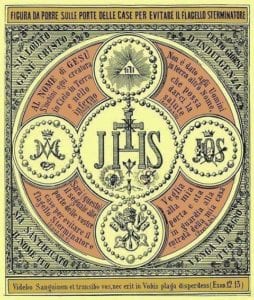
The Church reveals to us the wonders of the Incarnate Word by singing the glories of His Name. The name Jesus means Savior.
Persons who played prominent roles in the history of salvation received their names from God Himself. Adam means “man of the earth”; Eve means “mother of all the living”; Abraham means “father of many nations”; Peter means “the rock”. Even the Savior’s forerunner (John the Baptist) was given the name which God assigned to him. Therefore, according to divine precedent, the name of the Redeemer should not be of human choosing, but given by God Himself, for His Name should express His mission. We read in Sacred Scripture how the Archangel Gabriel revealed that Name to Mary: “You shall call His name Jesus.” (Luke 1:31)
And to St. Joseph, the Angel did not merely reveal the Name but explained its meaning: “You shall call His name Jesus, for He shall save His people from their sins.” (Matthew 1:21) The Messiah should not only be the savior, but should be called Savior. This is why we must esteem His Name as sacred. Whenever we pronounce it, we ought to bow our heads; for the very Name reminds us of the greatest favor we have ever received – salvation.
The power of the Holy Name of Jesus is deeply rooted in the Sacred Scriptures. Several episodes in the New Testament refer to the power of the invocation of the Holy Name: In Mark 9:38-39, demons were driven out; in Acts 3:6, Peter makes a crippled man walk and in Acts 9:32-34, Peter heals a paralyzed man. Reverence for the name of Jesus is emphasized in Philippians 2:10: “That in the name of Jesus every knee should bow, of those that are in heaven, on earth, and under the earth”. In Romans 10:13, Paul reiterates the salvific nature of the Holy Name by stating that those who “call on the name of the Lord” will be saved.
Devotion to the Holy Name was promoted in a special manner by St. Bernard, St. Bernardine of Siena, St. John Capistrano and by the Franciscan Order. It was extended to the whole Church in 1727 during the pontificate of Innocent XIII. In the 16th century, the Society of Jesus made the IHS monogram their emblem, adding a cross over the H and three nails underneath.
The city saved by the Holy Name of Jesus:
A devastating plague broke out in Lisbon in 1432. People fled in terror from the city and thus carried the plague to every corner of Portugal. Thousands of men, women and children of all classes were affected; people died everywhere, in the streets, in their houses, in the marketplaces, in the churches. In the words of historians, the epidemic flashed like lightning from person to person, or from a coat, a hat or any garment that had been infected. Bodies lay unburied in the streets, such that the dogs licked up the blood and ate the flesh of the dead, becoming themselves carriers of the dread disease and spreading it even more widely.
Among those who assisted the dying with unrelenting zeal was the venerable bishop Monsignor Andre Dias. Seeing that the epidemic grew every day in intensity, Dias urged the people to call on the Holy Name of Jesus. He urged everyone, whether sick or healthy, to repeat, “JESUS, JESUS.” He also urged the people to write the Holy Name on cards and to keep the cards on their persons, under their pillows and on doors. But above all, to constantly invoke with their lips and in their hearts this most powerful Name. Dias also summoned the people to the cathedral, where he blessed water in the Holy Name, ordering the people to sprinkle themselves and those who were sick and the dying with the holy water.
Wonder of wonders! The sick got well, the plague ceased and the city was delivered in a few days from this terrible plague. Soon after, all of Portugal was freed from the dreaded disease. The grateful people, mindful of the marvels they had witnessed, continued their love and confidence in the Holy Name of Jesus, so that in all their troubles, in all dangers, when evils of any kind threatened them, they invoked the Name of Jesus. Devotion to the Holy Name of Jesus became widespread, and the greatest curse that had ever fallen on the country was transformed into the greatest blessing.
The Catholic Church celebrates the memorial of the Most Holy Name of Jesus on January 3rd. In addition, the month of January has traditionally been dedicated to the Holy Name of Jesus. The feast day is intended to impress on Christians the dignity of the Holy Name of Jesus.